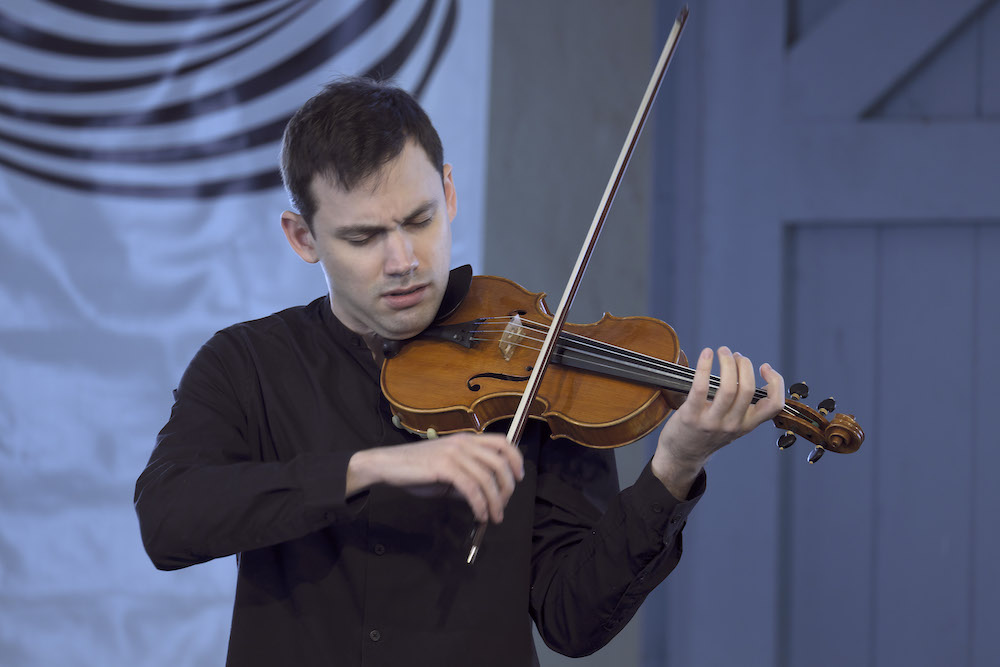While the opening concert of the Canberra International Music Festival demonstrated the wide-ranging scope of Artistic Director Roland Peelman’s Bach festival, Canberra violinist Kristian Winther’s survey of Bach’s works for solo violins was one, as Peelman put it, for the Bach purists.
 Kristian Winther at the Canberra International Music Festival. Photo © Peter Hislop
Kristian Winther at the Canberra International Music Festival. Photo © Peter Hislop
Bach’s Sei Solo a Violino senza Basso accompagnato (Six Solos for Violin Without Bass Accompaniment) survive in an autograph score in the composer’s hand dated 1720, when Bach was living in Cöthen. Some have concluded that the title ‘sei solo’ or ‘you are alone’ instead of the correct Italian, ‘sei soli’, is a reference to his grief at the sudden passing of his wife Maria Barbara, who died that year – though this is disputed. Whether or not the three sonatas and three partitas are autobiographical, this music for solo violin is complex and multi-layered, Bach writing for an instrument he was intimately familiar with. The six virtuosic works amount to a little over two hours of music, but performing the complete set from memory in a single day – across two sessions, in Winther’s case – is no mean feat, the exposed music requiring incredible focus, as well as mental and physical stamina. While Winther brought a formidable technique to bear on the solo works – there’s no question he can handle the virtuosic challenges – this was a performance that hit all the marks without quite lifting to the higher plane that Bach demands.
From the biting first chord, Winther’s Bach unfolded with a straight tone – never touched, even ornamentally, by vibrato – and a tendency to overdrive his sound, which often tipped over the edge into distortion in the double stops, causing the intonation to suffer. Despite the energy Winther brought to the music, this harsh edge – never entirely balanced by briefer moments of quiet reflection – made for an uneven listening experience. If there was a clear artistic vision for each movement – and, indeed, the cycle as a whole – it only reached the audience intermittently.
The earlier movements in the cycle – the first Sonata in particular – felt too rushed for the drama to build effectively, but Winther began to hit his stride in the Sarabanda of the first Partita, where he took a little more time to explore each of Bach’s lines and the Tempo di Borea had a festive, folky energy. It was the second Sonata, however, bringing the first concert to a close, that saw Winther begin to really catch fire. The thoughtful, improvisatory Grave gave way to a confidently rendered Fuga, with some beautiful moments of polyphony and a dramatic final flourish. If the Andante suffered somewhat from intonation problems, the reflective tone was well conjured, before the fiery Allegro – with compelling echo passages – delivered the theatre and flare missing from the earlier movements.
The second Partita, opening the evening concert, began confidently, Winther producing a warm tone and conversational phrasing in the Allemanda. The vigorous Corrente saw the tone again pushed beyond its limits, but the Giga was brilliantly dispatched. Winther launched attacka from the Giga into the mighty Ciaccona movement – perhaps the most significant milestone in the cycle – which gave it something of a breathless, hurried feel as the music ran full tilt into the opening chords of the theme and variations. Here the audience was treated to some more delicate moments and a wider variety of tone colours, Winther leaning in to moments of quiet polyphony, but unfortunately the movement wasn’t the climactic point in the cycle that it could have been. The opening to the third Sonata was a little uneasy, but the escalating intensity of the Fuga was nicely done, and there was a bright polish to some of Winther’s high-register playing in the Allegro assai that would have been welcome in more moments across the cycle, as well as a smiling final taper that allowed his personality to shine through. The final Partita gave us blistering virtuosity – not to mention some great folky effects in the Minuet movements – and Winther maintained the energy right to the finish-line of the final Gigue.
The first violinist of the Guaneri String Quartet, Arnold Steinhardt, described Bach’s Ciaccona from the second Partita as a life-long challenge, let alone the complete solo works. Winther’s marathon was an impressive feat of memory and technique, but his Bach solo cycle still has room to grow.
The Canberra International Music Festival takes place at venues around Canberra until May 12












Comments
Log in to join the conversation.